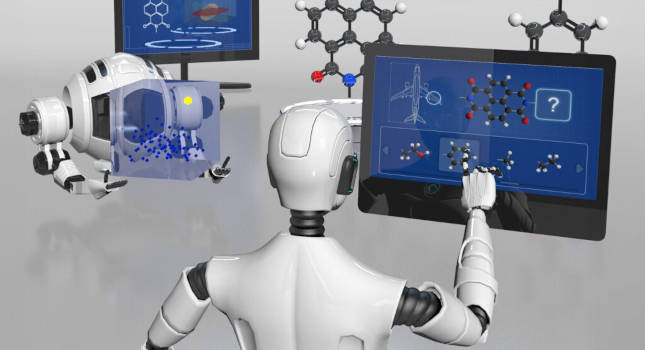
Machine Learning in Mechanical Engineering
The use of machine learning is proving to be a game-changer across various industries.
One sector that is experiencing a significant transformation is mechanical engineering. As the integration of artificial intelligence (AI) and machine learning (ML) becomes increasingly prevalent, the traditional paradigms of mechanical engineering are being redefined. This article explores the profound impact of machine learning in mechanical engineering, shedding light on the innovations, challenges, and future prospects within the field.
1. Enhancing Design Optimization

Machine learning algorithms are reshaping the design phase of mechanical engineering. By analyzing vast datasets and running simulations, machine learning models can optimize product designs for improved efficiency, durability, and performance. Engineers can now explore an extensive range of design possibilities, leading to more innovative and cost-effective solutions.
2. Taking Predictive Maintenance to Another Level
Machine learning empowers mechanical engineers to predict and prevent equipment failures. Through real-time monitoring and data analysis, machine learning algorithms can identify anomalies and patterns that indicate potential issues in machinery. This proactive approach reduces downtime, minimizes maintenance costs, and ensures the longevity of mechanical systems.
3. Improving Autonomous Vehicles and Robotics
Machine learning plays a pivotal role in the development of autonomous vehicles and robots. In the realm of mechanical engineering, these technologies rely on machine learning algorithms for navigation, object recognition, and decision-making. This convergence is revolutionizing transportation and manufacturing industries.
4. Promoting Energy Efficiency
Energy conservation is a critical concern in mechanical engineering, and ML offers solutions by optimizing energy usage. Smart systems powered by machine learning algorithms can adjust HVAC systems, lighting, and other mechanical components to minimize energy consumption without compromising comfort or productivity.
5. Analyzing Materials Science Advancements

Machine learning accelerates materials discovery and development. By analyzing the properties and behaviors of various materials, machine learning models assist engineers in selecting the most suitable materials for specific applications, resulting in more robust and efficient mechanical systems.
6. Optimizing Supply Chain Management
Efficient supply chain management is vital in mechanical engineering. Machine learning algorithms facilitate demand forecasting, inventory optimization, and logistics planning, ensuring that the right components are available when needed, reducing costs, and improving production efficiency.
Challenges and Considerations of Machine Learning in Mechanical Engineering

While machine learning offers immense potential, its integration into mechanical engineering comes with challenges. These include the need for large and high-quality datasets, algorithm transparency, and the continuous evolution of AI technologies. Engineers must also address ethical concerns, such as bias in AI decision-making processes.
The integration of machine learning (ML) in mechanical engineering has undoubtedly brought about transformative possibilities, but it also presents several challenges and considerations that engineers and organizations must navigate. Understanding these challenges is crucial for harnessing the full potential of machine learning in mechanical engineering. Here are some key points to consider:
Data Quality and Quantity
One of the primary challenges in machine learning is the availability of high-quality and sufficient data. For machine learning models to learn effectively, they require vast amounts of data that accurately represent the problem at hand. In mechanical engineering, obtaining comprehensive and clean datasets can be a daunting task, especially for specialized or niche applications.
Algorithm Selection
Choosing the right machine learning algorithms is critical. Different problems may require different algorithms, and selecting the wrong one can lead to suboptimal results. Mechanical engineers must possess a deep understanding of various ML algorithms and their suitability for specific tasks to make informed choices.
Interpretable Models
Interpreting the decisions made by ML models can be challenging. In many mechanical engineering applications, especially those involving safety-critical systems, it's essential to understand why a particular decision was made. Ensuring model transparency and interpretability is a priority in these scenarios.
Data Privacy and Security
When dealing with sensitive engineering data, maintaining data privacy and security becomes paramount. Engineers must implement robust security measures to protect data from breaches and unauthorized access while still making it accessible for ML model training and validation.
Computational Resources
Machine learning models, particularly deep learning models, can be computationally intensive. They often require significant processing power and memory, making them resource-intensive. Mechanical engineering organizations need to invest in adequate hardware and infrastructure to support ML initiatives effectively.
Skill and Expertise Gap
Building and deploying machine learning models require specialized skills and expertise that may not be readily available within traditional mechanical engineering teams. Bridging the skill gap through training and collaboration with data scientists is essential for successful ML adoption.
Ethical Considerations
Machine learning algorithms can inadvertently perpetuate biases present in training data. In mechanical engineering, this could lead to biased designs or decisions. Engineers must be aware of the ethical implications of their ML models and take steps to mitigate bias and ensure fairness.
Continuous Learning and Adaptation
Machine learning models need constant monitoring and maintenance to remain effective. Mechanical engineering systems evolve over time, and ML models should adapt to changing conditions. Engineers must implement strategies for model retraining and updates to maintain performance.
Regulatory Compliance
In some industries, mechanical engineering solutions must adhere to strict regulatory standards. Integrating ML into such environments necessitates thorough validation and compliance with industry-specific regulations, which can be a complex and time-consuming process.
Future Prospects of Machine Learning in Mechanical Engineering
The future of machine learning in mechanical engineering is promising. With ongoing research and development, we can expect even more advanced applications, such as generative design, where AI systems autonomously generate optimal designs, and the adoption of explainable AI to enhance transparency and decision-making.
Machine learning is reshaping the landscape of mechanical engineering. From design optimization and predictive maintenance to autonomous systems and materials science, ML is ushering in a new era of innovation and efficiency. While challenges remain, the field is poised for further advancements that will redefine the role of mechanical engineers in the modern world. As we move forward, embracing and mastering machine learning will be essential for those seeking to excel in the dynamic field of mechanical engineering.
Trending
-
1 Mental Health Absences Cost NHS £2 Billion Yearly
Riddhi Doshi -
2 Gut Check: A Short Guide to Digestive Health
Daniel Hall -
3 London's EuroEyes Clinic Recognised as Leader in Cataract Correction
Mihir Gadhvi -
4 4 Innovations in Lab Sample Management Enhancing Research Precision
Emily Newton -
5 The Science Behind Addiction and How Rehabs Can Help
Daniel Hall





Comments